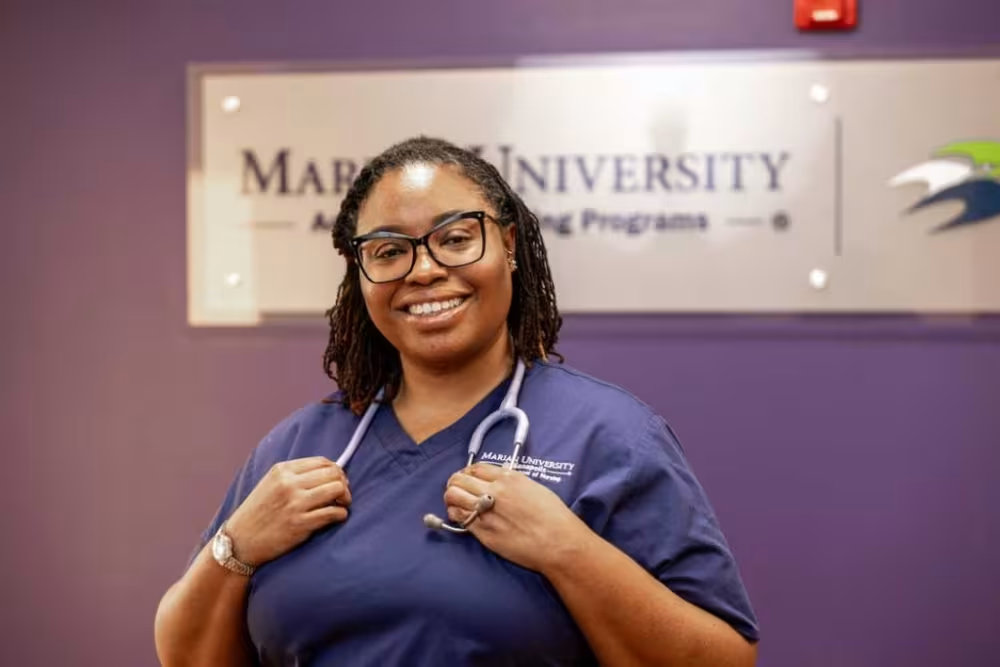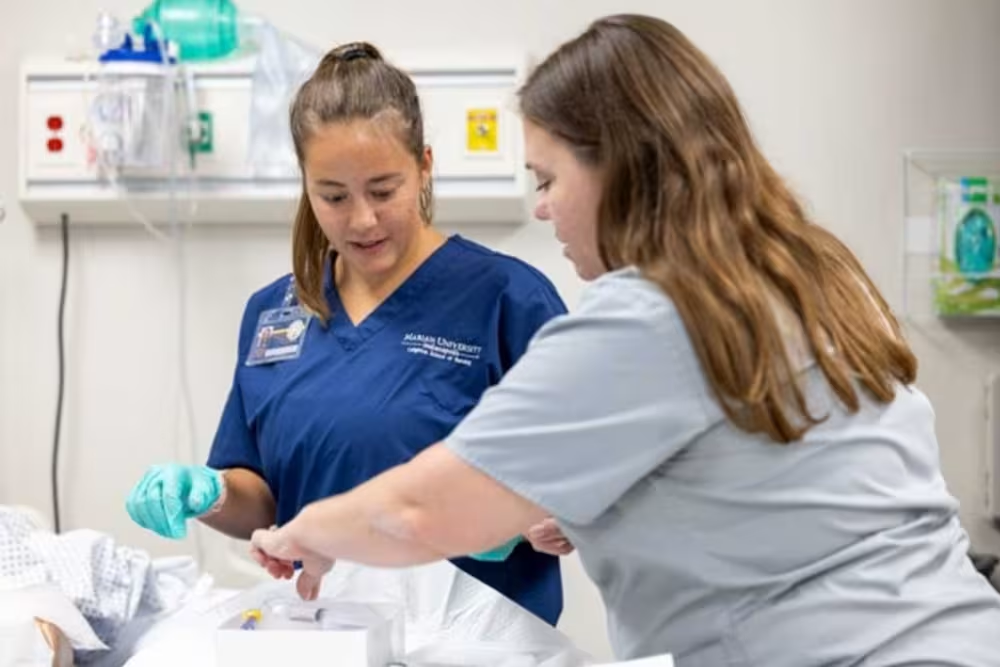How to Get Through Nursing School Successfully
Each blog post is dated and contains accurate information as of that date. Certain information may have changed since the blog post publication date. If you would like to confirm the current accuracy of blog information, please visit our ABSN overview page or contact admissions at 866.892.6463.
Wondering how to be successful in nursing school? To succeed in a program like Marian ABSN, you should stay dedicated and organized, manage your time well and use support resources. Avoid making mistakes like overcommitting, underestimating how much preparation you need, and not cultivating a personal network.

Nursing school can be challenging and requires dedication, especially if you enroll in an accelerated program. Tips for how to be successful in nursing school include remembering your reasons for wanting to become a nurse, managing your time, staying organized, and using support resources.
At Marian University, we provide extensive support to students in our Accelerated Bachelor of Science in Nursing (ABSN) program. In as few as 16 months, you can complete a comprehensive curriculum of online coursework with in-person nursing skills and simulation labs and clinical rotations. This program requires hard work, but after graduating you can be ready to enter a new career path and make a difference.
If you’re ready to work toward becoming a nurse, let’s explore some best practices for being successful and highlight common mistakes to avoid.
1. Keep Your Motivation in Mind
If you are going to become a nurse, you’re likely motivated by a desire to help people. That motivation can be a powerful driver, and can translate to the many assignments, tests, and challenges you will encounter as a student. Let your natural compassion be fuel for motivation, and it can give the drive to succeed to carry you through.
2. Practice Time Management
As a nursing student, you will have your hands full while completing this 16-month comprehensive nursing curriculum. You will need to balance your time across:
- Assignments
- Clinical rotations
- Course lectures
- Nursing simulation labs
- Nursing skills labs
- Studying
Each of these is a significant commitment on its own. Compressing a four-year traditional degree path down to 16 months requires stringent time management, and we advise students to treat this commitment like a full-time job. Use a planner, set priorities, and break big tasks up into smaller steps. You will find your time as a student feels faster than you might think.

3. Be Organized
From the start of the admissions process, organization can help you succeed. When speaking with a Marian admissions advisor as a prospective student, take notes about information that you need to send in with your application. Add important due dates to your calendar like your target start date, application deadlines, and appointments with your advisor. They will remind you of everything you will need to apply, but keeping everything organized from the start is good practice.
Once you start as a nursing student, you should organize your notes and study materials, as well as any significant dates. Look up resources for organization, consult with school faculty and staff, and fellow cohort members, and implement a system that works for you.
4. Maintain Professionalism
From day one as a nursing student, and especially in an ABSN program like Marian’s, you are preparing to enter a healthcare career that requires preparation and professionalism. Professionalism goes beyond your image; it is about building the habits that will support your career and prepare you to care for others. A compassionate bedside manner and keeping calm under pressure are both reflections of professionalism.
Maintain professionalism throughout courses, labs, and clinicals by using friendly and professional language and accepting feedback gracefully. Speaking clearly and respectfully helps when managing a patient care scenario and accepting feedback signals that you are receptive and willing to learn. Both can go a long way in establishing a working relationship with those around you.
5. Use Support Resources
The best nurses know when to lean on their team for support, and learning how to access help will give you the best possible chance of success as a student. With the help of the admission advisors at Marian University, you can learn exactly what to expect from the admission process, completing your prerequisites, and the nursing school itself.
Your instructors want to see you succeed and are available to answer questions throughout your time as a student. Reach out to fellow cohort members, as well, to form a study group or compare notes. If you have a personal support network, take them up on their offers to lighten the load as you study.

See some of the top tips for studying in nursing school and try applying some of these methods to your own routine!
6. Practice Self-Care
Nursing school is demanding, but pushing yourself to the edge only leads to worse outcomes for you and your patients alike. Try practicing self-care through methods like:
- Getting enough sleep
- Eating balanced, nutritious meals
- Scheduling downtime
- Staying active
- Reflecting on the state of your mental health
Staying driven requires self-care, so don’t overwork yourself to exhaustion. Taking time for yourself is the healthiest option in the long run.
Common Mistakes Nursing Students Make and How to Avoid Them
Some might think about how to succeed in nursing school, while others might focus more on how to survive nursing school. There is room for both mindsets, and both outlooks require avoiding some common mistakes that could get in the way of your success. Let’s examine some of the most likely errors you might be inclined toward as an ABSN student.
1. Overcommitting
Any nursing program, especially a 16-month program offering like Marian ABSN, will be an intensive and challenging process. You will be thinking about nursing nearly every day, and the commitment is roughly in line with a full-time job.
Don’t overcommit. Take the time to sit down and honestly evaluate how much work you can get done in a given time. You might be inclined to work a second job to make money while attending school, but make sure that your commitments will leave you with enough time. Overcommitting will eventually hold you back in all of them.

2. Underestimating How Much Preparation Time You Will Need
Some of the best advice on how to get through nursing school involves creating a rigorous study and prep schedule that goes beyond what the curriculum demands. Nursing labs and clinical rotations as a Marian ABSN student are one example of this. You should reflect on your nursing skills and techniques before you start, taking time to visualize putting some of these into action.
You should also spend time after labs and clinicals doing a mental debrief, reflecting on what happened and seeing how you could have responded differently in a given situation. Marian’s ABSN program holds debrief sessions after nursing skills and simulation labs. Make sure you do this regardless of program, adding debriefing sessions to clinicals would also be helpful. You won’t find this in the curriculum, but not planning for it could limit how much you learn.
3. Not Cultivating Your Network
It’s easy to think of nursing school as an individual challenge, but the connections you build as a nursing student can enhance how much you learn and open doors for your future career. Nursing is an expanding field with plenty of prospects, but you should give yourself the best possible chance to succeed. As a Marian ABSN student in Indianapolis, Indiana, or Nashville, Tennessee, you will participate in clinical rotations and treat real patients under supervision at leading local healthcare facilities.

See some of what to expect during clinical rotations in nursing school.
The nurses you work with during clinicals are expert practitioners. Cultivating relationships with them can foster a sense of trust and leads you to feel more comfortable asking more questions. While there are no job guarantees after graduation and licensure, students who display talent and work closely with other nurses may enjoy more opportunities.
Successfully Earn Your Nursing Degree With Marian ABSN
With more knowledge of how to be successful in nursing school and how to avoid common nursing school mistakes, you can start your journey toward a BSN degree with confidence. Marian University’s ABSN program offers a 16-month pathway to a new degree and a new career path. If you are a dedicated student driven to help others, contact us today to speak with an admissions advisor and take the next step.
